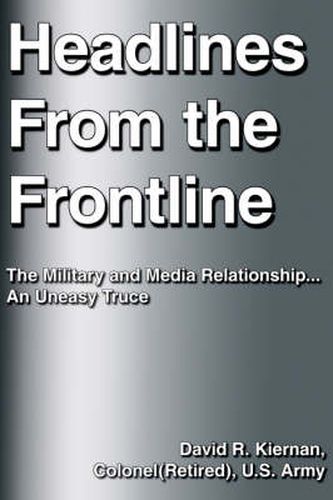Readings Newsletter
Become a Readings Member to make your shopping experience even easier.
Sign in or sign up for free!
You’re not far away from qualifying for FREE standard shipping within Australia
You’ve qualified for FREE standard shipping within Australia
The cart is loading…






This title is printed to order. This book may have been self-published. If so, we cannot guarantee the quality of the content. In the main most books will have gone through the editing process however some may not. We therefore suggest that you be aware of this before ordering this book. If in doubt check either the author or publisher’s details as we are unable to accept any returns unless they are faulty. Please contact us if you have any questions.
A generation of journalists have come along who never experienced any of the systems of censorship and control of journalistic endeavor that were common in wars prior to the one in Southeast Asia. In such a situation, there is a premium on the need for understanding. If journalist and soldier are forever to be facing each other across from their respective barricades, at best observing uneasy truces, there needs to be a constant flow of communication designed to keep the aims clear and the issues current. When a military person succeeds well in doing that, we journalists naturally will be eager to say thanks. Such a one is Col. (Ret.) David R. Kiernan, who is Vice President of Strategic Communications at MPRI in Alexandria, Virginia. Through study and career-oriented academic research, Kiernan may be the best informed person today on the past, present, and future of the First Amendment, and the military. He is among a new breed of Army Public affairs professionals. A graduate of Virginia Military Institute, he received a master’s degree in mass communication from the University of South Carolina, was editor of the prestigious Infantry Journal at Fort Benning, Georgia and Pentagon Chief of Media Relations for the US Army during the Gulf War. This book will whet the reader’s appetite for several areas of study, especially about the censorship programs of World War I and II and the Korean War. The conclusion is thus inevitable and correct: censorship could not have changed the outcome of the Vietnam War, but press coverage of the war obviously did have an impact on public attitudes and support of the conflict. On this issue and many others, Kiernan has put together an excellent assessment and guide to understanding the military-media relationship. This work will assuredly become the handbook for both journalist and soldier, alike.
$9.00 standard shipping within Australia
FREE standard shipping within Australia for orders over $100.00
Express & International shipping calculated at checkout
This title is printed to order. This book may have been self-published. If so, we cannot guarantee the quality of the content. In the main most books will have gone through the editing process however some may not. We therefore suggest that you be aware of this before ordering this book. If in doubt check either the author or publisher’s details as we are unable to accept any returns unless they are faulty. Please contact us if you have any questions.
A generation of journalists have come along who never experienced any of the systems of censorship and control of journalistic endeavor that were common in wars prior to the one in Southeast Asia. In such a situation, there is a premium on the need for understanding. If journalist and soldier are forever to be facing each other across from their respective barricades, at best observing uneasy truces, there needs to be a constant flow of communication designed to keep the aims clear and the issues current. When a military person succeeds well in doing that, we journalists naturally will be eager to say thanks. Such a one is Col. (Ret.) David R. Kiernan, who is Vice President of Strategic Communications at MPRI in Alexandria, Virginia. Through study and career-oriented academic research, Kiernan may be the best informed person today on the past, present, and future of the First Amendment, and the military. He is among a new breed of Army Public affairs professionals. A graduate of Virginia Military Institute, he received a master’s degree in mass communication from the University of South Carolina, was editor of the prestigious Infantry Journal at Fort Benning, Georgia and Pentagon Chief of Media Relations for the US Army during the Gulf War. This book will whet the reader’s appetite for several areas of study, especially about the censorship programs of World War I and II and the Korean War. The conclusion is thus inevitable and correct: censorship could not have changed the outcome of the Vietnam War, but press coverage of the war obviously did have an impact on public attitudes and support of the conflict. On this issue and many others, Kiernan has put together an excellent assessment and guide to understanding the military-media relationship. This work will assuredly become the handbook for both journalist and soldier, alike.